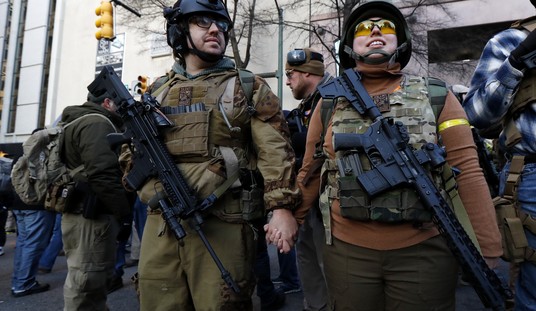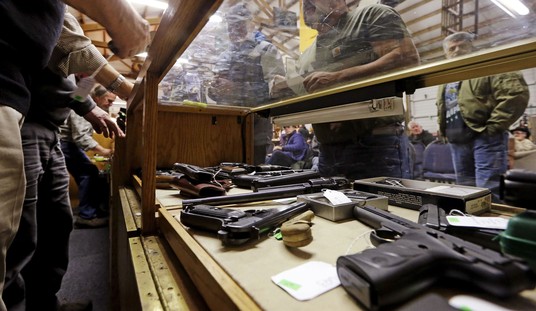We're still waiting to see what the Court will do with the Rahimi and Cargill cases, but the justices delivered a significant victory to the National Rifle Association in a First Amendment case on Thursday. In a 9-0 ruling, the Court concluded that the NRA had raised a plausible claim that the then-head of New York's Department of Financial Services had coerced insurance companies regulated by her office to drop their ties to the NRA in order to "punish or suppress views" that the she disagreed with.
Justice Sonia Sotomayor authored the opinion of the Court, with Neil Gorsuch and Ketanji Brown Jackson issuing concurring opinions. All nine of the justices agreed that the Second Circuit Court of Appeals was wrong to dismiss the NRA's First Amendment claims, and they sent NRA v. Vullo back to the appellate court for further review in light of their findings.
The dispute stems from the actions of then-DFS Superintendent Maria Vullo, who went after the NRA for its ill-fated Carry Guard insurance program, along with insurer Lockton. After the Parkland shooting in 2018, Vullo allegedly targeted other insurance companies that had ties to the NRA; essentially informing them that continuing to do business with the 2A organization would make them primary targets of her office in the future.
Following the shooting, the NRA and other gun-advocacy groups experienced “intense backlash” across the country. Major business institutions, including DFS-regulated entities, spoke out against the NRA, and some even cut ties with the organization. MetLife, for example, ended a discount program it offered with the NRA. On February 25, 2018, Lockton’s chairman “placed a distraught telephone call to the NRA,” in which he privately shared that Lockton would sever all ties with the NRA to avoid “‘losing [its] license’ to do business in New York.” Lockton publicly announced its decision the next day. Following Lockton’s decision, the NRA’s corporate insurance carrier also severed ties with the organization and refused to renew coverage at any price. The NRA contends that Lockton and the corporate insurance carrier took these steps not because of the Parkland shooting but because they feared “reprisa[l]” from Vullo.
Around that time, Vullo also began to meet with executives at the insurance companies doing business with the NRA. On February 27, Vullo met with senior executives at Lloyd’s. There, speaking on behalf of DFS and then-Governor Andrew Cuomo, Vullo “presented [their] views on gun control and their desire to leverage their powers to combat the availability of firearms, including specifically by weakening the NRA.” She also “discussed an array of technical regulatory infractions plaguing the affinity insurance marketplace” in New York. Vullo told the Lloyd’s executives “that DFS was less interested in pursuing the[se] infractions” unrelated to any NRA business “so long as Lloyd’s ceased providing insurance to gun groups, especially the NRA.” Vullo and Lloyd’s struck a deal: Lloyd’s “would instruct its syndicates to cease underwriting firearm-related policies and would scale back its NRA-related business,” and “in exchange, DFS would focus its forthcoming affinity-insurance enforcement action solely on those syndicates which served the NRA, and ignore other syndicates writing similar policies.”
In other words, Vullo was allegedly willing to look the other way if Lloyds and other insurance companies had violated DFS regulations, so long as they cut any and all ties with the NRA.
Vullo didn't stop there. She issued several guidance letters to the insurance and financial services industries titled “Guidance on Risk Management Relating to the NRA and Similar Gun Promotion Organizations," in which she "pointed to the 'social backlash' against the NRA and other groups 'that promote guns that lead to senseless violence' following 'several recent horrific shootings, including in Parkland, Florida.' Vullo then cited recent instances of businesses severing their ties with the NRA as examples of companies 'fulfilling their corporate social responsibility.'"
Vullo was clearly using her position as head of a regulatory agency to hurt the NRA by making it dangerous to do business with the organization; not because of Wayne LaPierre's fancy suits or private plane rides, but because the NRA advocates for a strong and secure Second Amendment.
Today's decision doesn't end the NRA's lawsuit against Vullo, nor does it guarantee that the organization will ultimately be victorious in their litigation. In fact, the Court explicitly told the Second Circuit Court of Appeals that it's still free to consider a claim of qualified immunity for Vullo going forward. But the decision's "critical takeaway" is that "the First Amendment prohibits government officials from wielding their power selectively to punish or suppress speech, directly or (as alleged here) through private intermediaries."
The NRA was represented by the ACLU in oral arguments before the Court, which is another sign of just how egregious Vullo's actions were. The ACLU is hardly a defender of the Second Amendment, but even it couldn't ignore the blatant attack on the NRA's First Amendment rights. Even the Biden administration weighed in with partial support for the NRA's position; perhaps because if New York officials could get away with chilling the First Amendment rights of Second Amendment organizations, there would be nothing stopping officials in Texas or Alabama from doing the same to groups advocating for gun control, abortion, or a host of other progressive policy positions.
The Court made the right call here, and I'm glad to see it was a clean sweep for the NRA among the justices. I doubt we'll see that same unanimity when it comes to the bump stock ban or the question of prohibited persons, but for today, at least, the Court was on (mostly) the same page when the First Amendment rights of Second Amendment advocates were at stake.









Join the conversation as a VIP Member